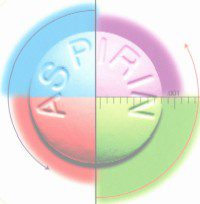Do not give children anti-nausea medication without a doctor’s prescription, and do not worry too much about this condition as children usually vomit a few times and then stop. However, if the child shows signs of dehydration and electrolyte imbalance, they should be taken to see a doctor immediately.
You should also avoid giving your child the following medications:
Aspirin
 |
|
Aspirin (Photo: mercola) |
Aspirin can irritate the stomach, causing pain or gastrointestinal bleeding, especially in individuals with a history of peptic ulcers. Moreover, there is a very dangerous complication that can occur in young children when taking aspirin, known as Reye’s syndrome, which, although rare, can be fatal. Therefore, aspirin should never be given to children.
Always ensure that any medication prepared for your child does not contain aspirin by carefully reading the instructions included with the medication, as many medications contain multiple ingredients including aspirin. For example, Pepto-Bismol contains aspirin.
Medications Intended for Adults
Never give your child medication that you are currently taking, even in smaller doses, if the instructions do not provide a recommended dosage for children, as their bodies are not fully developed.
Medications Prescribed for Other Children or Conditions
Many mothers, in a moment of confusion when their child is ill, may easily follow the advice of another mother and reuse a previous prescription from that child due to similar symptoms. The result can be that the illness does not improve and may even worsen. Therefore, only give medications that are prescribed specifically for your child, and do not reuse prescriptions, as it’s uncertain whether your child has the same condition or severity as before.
Expired Medications
When purchasing medication, be sure to check the expiration date carefully, and choose packages with clearly printed expiration dates rather than loose pills. If buying medication for home storage, request packages with a long shelf life.
Combination Medications
Many medications combine different active ingredients, some of which may not be suitable for children. For instance, cold medications that combine paracetamol with codeine or with another non-steroidal anti-inflammatory drug to enhance pain relief. It is advisable to consult a healthcare professional when using these.
Non-Steroidal Anti-Inflammatory Drugs (NSAIDs)
These medications often cause stomach irritation, especially ibuprofen, so most manufacturers recommend not using them in children under 12 years old to prevent potential side effects, particularly when the child is vomiting.
Forms Not Suitable for Children
Tablet or chewable forms can be dangerous for children if the pill gets lodged in the airway. Therefore, if medication is necessary, opt for liquid forms such as dissolvable tablets or syrups…
In conclusion, for the safety of your child, it is best to consult a doctor or pharmacist before administering any medication.


















































